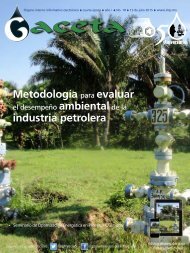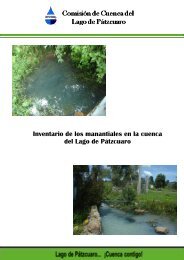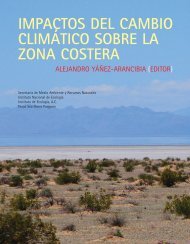Desire for Greener Land
Desire for Greener Land
Desire for Greener Land
You also want an ePaper? Increase the reach of your titles
YUMPU automatically turns print PDFs into web optimized ePapers that Google loves.
Assessment<br />
Impacts of the Technology<br />
Production and socio-economic benefits Production and socio-economic disadvantages<br />
increased farm income, diversification of income sources<br />
increased production area and diversification<br />
increased crop yield<br />
increased wood and fodder production and quality<br />
reduced animal production<br />
anticipated impact on the community due to the huge<br />
benefits which may induce corruption, violence, etc.<br />
Socio-cultural benefits Socio-cultural disadvantages<br />
improved conservation / erosion knowledge<br />
improved situation of disadvantaged groups<br />
improved food security / self-sufficiency<br />
conflict mitigation<br />
improved health (through medicinal plants and income)<br />
Ecological benefits Ecological disadvantages<br />
improved harvesting of water, increased soil moisture<br />
reduced surface runoff and soil loss<br />
improved soil cover<br />
increased animal, plant and habitat diversity<br />
increased biomass and nutrient cycling<br />
socio cultural conflicts<br />
increased health problems (due to alcohol)<br />
increased fire risk<br />
Off-site benefits Off-site disadvantages<br />
reduced downstream flooding and siltation<br />
reduced damage on neighbours fields and on public / private infrastructure<br />
increased biodiversity<br />
increased water availability<br />
Contribution to human well-being/livelihoods<br />
the production of the mezcal drink (with designation of origin) from agaves, and/or medicinal products, will generate very high<br />
incomes <strong>for</strong> stakeholders which change their life and allow farmer's sons to stay in the community and work in their fields.<br />
Benefits/costs according to land user<br />
That is why state institutions fund the installations of this<br />
system, although the production has not started yet. After<br />
that, benefits generated will be enough to motivate people to<br />
increase the surface to remediate by themselves, without<br />
economical helps.<br />
Benefits compared with costs short-term: long-term:<br />
Establishment negative very positive<br />
Maintenance/recurrent negative very positive<br />
Acceptance/adoption:<br />
All the land user families (50 families; 10% of area) who implemented the technology received an external material support. As the<br />
programme only started in 2010, it is impossible to have an exact overview of the results (end of 2011). As the land users belong to the<br />
same community ("ejido"), <strong>for</strong>mally, all the inhabitants are involved in some way. It is too early to identify an adoption trend.<br />
Concluding statements<br />
Strengths and how to sustain/improve Weaknesses and how to overcome<br />
Remediation of degraded land turning it to a sustainable production<br />
generating very high incomes in the medium term life will change<br />
drastically and not necessarily <strong>for</strong> the better. Transparency and<br />
communication regarding benefits and land use are necessary<br />
Low-cost project but it needs to be funded and supported with<br />
technical and institutional advice to initiate the first cycle of the<br />
project Farmers can start to produce their mezcal from the wild<br />
agaves to sell them to wholesalers and use this money to pay <strong>for</strong><br />
the project.<br />
As a result of the economic benefits, young people will stay in the<br />
communities Involve the young to guarantee the future: develop<br />
the marketing, the diversification of the products, the quality of<br />
production, etc.<br />
It will hopefully reduce the number of cattle, which are the main<br />
cause of soil erosion, as farmers lose interest in cattle raising <br />
Authorities need to monitor this and in<strong>for</strong>m the farmers about the<br />
ecological impact of too much free cattle grazing<br />
Obligation to find external funds to pay the first steps of the system<br />
(greenhouse, planting etc.) due to the lack of incomes amongst<br />
farmers Involvement of all stakeholders in the project<br />
Ensuring that alcohol production will not be consumed in excess in<br />
the community control of the volume of the production, and the<br />
sufficiently high selling price should avoid "losing" the production at<br />
local scale<br />
Risk that the benefits will be captured by few people <br />
transparency and stakeholder communication in accounting <strong>for</strong> the<br />
benefits<br />
Marketing and selling the products authorities help the farmers to<br />
contact sellers. The <strong>for</strong>mation of communities of producers, leading<br />
to products con<strong>for</strong>ming to regulations that maintain good quality<br />
and provide certification.<br />
Owing to the high incomes, life will change drastically and not<br />
necessarily <strong>for</strong> the better.<br />
Key reference(s): Colunga-García Marín P., D. Zizumbo-Villareal, J.T. Martínez. 2007. Tradiciones en el aprovechamiento de los agaves mexicanos: una aportación<br />
a la protección legal y conservación de su diversidad biológica y cultural. In: En lo Ancestral hay Futuro: del Tequila, los Mezcales y otros Agaves. P. Colunga-<br />
GarcíaMarín, L. Eguiarte, A. Larqué, D. Zizumbo-Villarreal (eds). CICY-CONACYT-CONABIO-SEMARNAT-INE. México D.F., pp. 85-112.<br />
Contact person(s): Alejandro Martínez Palacios, UMSNH-Universidad Michoacana San Nicolas de Hidalgo, Morelia, Mexico, apalacios56@gmail.com<br />
Christian Prat, IRD-Institut de Recherche pour le Développement, France, christian.prat@ird.fr<br />
164 DESIRE – WOCAT <strong>Desire</strong> <strong>for</strong> <strong>Greener</strong> <strong>Land</strong>









